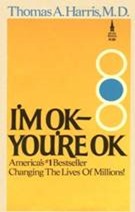
One of the best tips I can give parents is to shift to an “I’m OK – You’re OK” parenting framework. I came across this framework over 30 years ago, in a tiny little book. I was studying at the time and was fascinated by the simplicity of it. Later on, when I started teaching kids, I adopted this mindset. It allowed me to help them so much that when I had my own kids, I adopted an “I’m OK-You’re OK” parenting style. It worked like magic for me and I would like to share it with you.
Children are natural Zen masters; their world is brand new in each and every moment
― John Bradshaw
The Book
I’m OK – You’re OK is a psychological thesis written in 1972 by a psychiatrist called Thomas A. Harris. It was a self-help book designed to help people solve problems. I find it an excellent tool for solving problems in the family and one of the best parenting tools. It is very much connected to development in emotional intelligence, where we each have to master the skills of managing our own emotions and those of others.

The four levels of emotional intelligence are:
- Recognizing my feelings
- Managing my feelings
- Recognizing others’ feelings
- Helping and supporting others to manage their own feelings
Parents need to master levels 1 and 2 before they can do 3 and 4. In order to help your child recognize and manage their feelings, you have to be able to do it for yourself.
In order to do that, Harris recommends and I’m OK, You’re OK frame of mind. According to Harris, people (both kids and adults) can take 1 of 4 approaches in life:
- I’m OK – You’re OK
- I’m OK – You’re not OK
- I’m not OK – You’re OK
- I’m not OK – You’re not OK
I’m OK – You’re OK

The first position is the desired state of mind. Parenting is very easy and happy from this perspective. In this state, people are happy and confident with themselves and comfortable with the rest of the world (for example, their kids, their partners, bosses, and friends).
People in this state are generally happy with their lives. Their relationships are better, their parenting style is very confident and generally, their kids are happy and successful.
I’m OK – You’re not OK
Life is not always full of roses and things do go wrong. It is very natural to experience frustration sometimes. However, an I’m OK – You’re not OK mentality is not healthy. This is when we start blaming others for the problems in our lives. An example of parenting from this perspective is like saying, “Those kids do not appreciate what I do for them”. People in this state are in constant conflicts with the people around them. They find it hard to manage their feelings because they do not take responsibility for their own feelings. This group of people find fault in other very easily. They play the blame game a lot.
I’m not OK – You’re OK
This state of mind indicates low self esteem. It is a sense of eternal guilt. A person in this mindset takes the “blame” for everything that goes wrong. Children grow and tackle new challenges with every experience. But a parent who takes the “I’m OK, you’re not OK” perspective will blame themselves for every challenge.
I’m not OK – You’re not OK

This is the worst state to be in. People in this mind frame do not value themselves and do not value others. In this mode they can be very distractive and depressed. They have low self esteem and blame the rest of the world for it. In parenting, this is a hard state to be in as kids growing with a parent in this state, are guaranteed to be kids with low self esteem and not be able to take responsibility over their life.
These are the basic states of the “I’m OK, You’re OK” framework. Join me next time for the next chapter of the “I’m OK , You’re OK ” parenting , where I will cover what parents should do to raise kids in the right state.
I’m OK – You’re OK,
Ronit
This post is part of the series I'm OK - You're OK Parenting:
- I’m OK, You’re OK Parenting: OK and EQ
- I’m OK, You’re OK Parenting: Shame
- I’m OK, You’re OK Parenting: Guilt
- I’m OK, You’re OK Parenting: Parenting Styles
- I’m OK, You’re OK Parenting: Being an “I’m OK” Parent
- I’m OK, You’re OK Parenting: Being a “You’re OK” Parent
- I’m OK, You’re OK Parenting: “I’m OK” Beliefs











